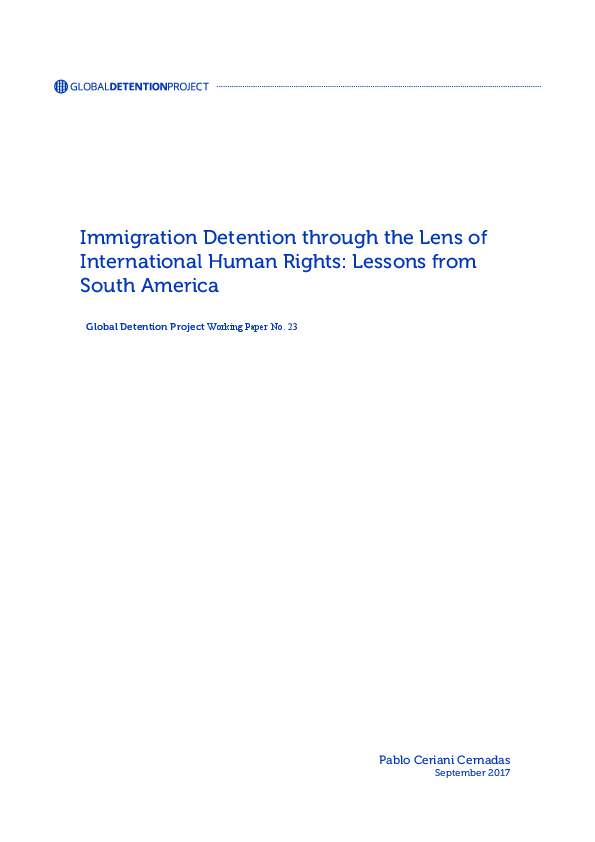In March, Uruguay President Luis Lacalle Pou moved to impose a series of COVID-related restrictions, including closing non-essential shops and closing its border with Brazil. The moves–which notably did not include lock-down–came after the first COVID-19 case was confirmed in Montevideo on 13 March 2020. As of 30 November 2020, Uruguay had reported less than […]
Last updated: July 2024
DETENTION STATISTICS
Migration Detainee Entries
DETENTION CAPACITY
ALTERNATIVES TO DETENTION
ADDITIONAL ENFORCEMENT DATA
PRISON DATA
POPULATION DATA
LEGAL & REGULATORY FRAMEWORK
Does the Country Have Specific Laws that Provide for Migration-Related Detention?
GROUNDS FOR DETENTION
Immigration-Status-Related Grounds
LENGTH OF DETENTION
DETENTION INSTITUTIONS
PROCEDURAL STANDARDS & SAFEGUARDS
COSTS & OUTSOURCING
COVID-19 DATA
TRANSPARENCY
MONITORING
NATIONAL HUMAN RIGHTS MONITORING BODIES
NATIONAL PREVENTIVE MECHANISMS (OPTIONAL PROTOCOL TO UN CONVENTION AGAINST TORTURE)
NON-GOVERNMENTAL ORGANISATIONS (NGOS)
GOVERNMENTAL MONITORING BODIES
INTERNATIONAL DETENTION MONITORING
INTERNATIONAL TREATIES & TREATY BODIES
International Treaties Ratified
Ratio of relevant international treaties ratified
Individual Complaints Procedures
Relevant Recommendations or Observations Issued by Treaty Bodies
cases of labour exploitation, without fear of arrest, detention or deportation;
regulations protecting migrant workers against abuse and exploitation, facilitate access
to effective legal remedies, with interpreting services, and ensure that workers can
access those remedies without fear of reprisal, detention or deportation...
43. Bearing in mind the Committee’s previous recommendations,9 the State party
should establish a statutory time limit on the duration of immigration detention and
ensure that detention is used only as a measure of last resort and for the shortest
possible period of time, and increase the use of alternatives to detention, particularly
for children, pregnant women and families with children, that are respectful of human
rights, including the right to privacy, instead of surveillance-based technological
alternatives.
prison conditions, taking particular account of the situation of migrant workers,
ensure that this group does not suffer overcrowding, and guarantee that migrant
workers deprived of their liberty are informed of their rights to appropriate legal and
consular assistance.
> UN Special Procedures
Visits by Special Procedures of the UN Human Rights Council
> UN Universal Periodic Review
Relevant Recommendations or Observations from the UN Universal Periodic Review
REGIONAL HUMAN RIGHTS MECHANISMS
Regional Legal Instruments
HEALTH CARE PROVISION
HEALTH IMPACTS
COVID-19
Country Updates
Government Agencies
National Migration Directorate & Ministry Of interior - https://www.gub.uy/ministerio-interior/direccion-nacional-migracion
Ombudsman office - https://www.gub.uy/institucion-nacional-derechos-humanos-uruguay/
International Organisations
UNHCR Country Office - https://www.unhcr.org/where-we-work/countries/uruguay
IOM Office Office - https://lac.iom.int/en/uruguay
ILO Country Office - https://www.ilo.org/regions-and-countries/latin-america-and-caribbean/uruguay
NGO & Research Institutions
Amnesty Country Office - https://www.amnesty.org/en/location/americas/south-america/uruguay/
Human Rights Watch Country Office - https://www.hrw.org/americas/uruguay
Caritas - https://www.caritas.org/where-caritas-work/latin-america/uruguay/


.jpeg)

